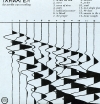Loren Mazzacane Connors/Christina Carter, "Meditations on the Ascension of Blind Joe Death Vol. One"
- Administrator
- Albums and Singles
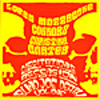
Ecstatic Yod
The artworkis absolutely gorgeous, imitating the style of many of Fahey's recordcovers down to the small essays sometimes included on the back of hissleeves. The music, however, does not recall the material on Fahey's Blind Joe Deathrecords. Instead, Connors and Carter have opted to stick their guns andrecord the music as they know best. This undoubtedly works to theiradvantage as any attempt at copying Fahey's style on these recordswould be both redundant and futile. The record is broken into twoside-long pieces, each of which is broken into several parts. The firstside, entitled "Smoke," includes piano and a guitar whose tone iswhite, but distorted by some blanket, as though I'm only catchingechoes of the actual performance. The movement of both instruments isslow, cold, and somber, invoking Fahey's ghost in a series of drawn outtones and shadowy folds. The guitar playing, at times, is reminiscentof Fahey's latter work, but remains far less complex and more focusedon atmospheric effect. Haunting in its slow creep, the seven-part trackslowly fades away and leaves a feeling of complete emptiness andabsence; Fahey is obviously missed. The second side is entitled"Mirrors" and is broken into five pieces. The guitar and piano on thisside move with a certain grace that reminds me entirely of Faheywithout being an actual copy of his work. The mood is still solemn insome ways, but the instruments have more life in them and each notesomehow vibrates and harmonizes with Fahey's attitude and approachtowards music. The album ends with a sample of a recording from whatmight be an old 78 playing in the background. It simultaneously makesreference to Fahey's love for the history of blues and folk music andto Death himself, still responsible but unknown for so much greatmusic.
Read More
- Administrator
- Albums and Singles
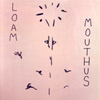
Ecstatic Peace
It's messy, beautiful, and recalls all the effects and variables of apsychedelic painting or a hyper-real physical experience. Theinstruments swim in and out of each other while a clattering of sheetmetal provide a point of reference or a singularity through which allthe random sounds can be filtered and processed. "Yota" and "SheepDust" together and together they sound like one fantastic side-longepic of feedback and blossoming pseudo-melodies. The second side,however, fails to provide anything too interesting. More solid andcomplete rhythms come from this duo on the last three tracks and theirguitar work ruins the moody and elemental nature that they introducedon the first half of the record. It's difficult even saying thisbecause the first two tracks have been spinning for about eightrotations now and I can't bring myself to stop the constant onslaughtof the keyboard-like melodies and the ear-splitting bursts of static,whines, and hellish winds. "Must Anubis" and "Throat" both have theirmoments, but less vibrant and seemingly less thought out ideas manifeston them. If only these songs hadn't been released on this record; theydon't even sound like they belong on the same album as "Yota" and"Sheep Dust." Those two songs have me absolutely spellbound and standout as two of my favorite songs I've heard this year.
samples:
- Labels, please send CD-Rs with your LP releases or just send a CD-R. We love samples.
Read More
- Administrator
- Albums and Singles
I have to admit that I'd previously never been a huge fan of Tarwater, despite their being an integral part of the German electro/pop scene with a direct connection to one of my favorite groups in the last five or so years: To Rococo Rot.
For some reason, the bits and pieces I had heard over the span of a few of their discs just did not appeal to me, although all the key "cool" elements were there: slick, programmed minimalist grooves augmented with drum kit; simple and punchy bass lines occasionally performed on the upright; lush layers of synthesizers drawing out interesting chord progressions. With their recent move to the Morr label, I can now say that I've quickly fallen for them thanks in part to the subsequent release of their brilliant The Needle Was Traveling disc. All the same elements as before are present, only now with a clearly defined direction, clever hooks, swifter tempos and catchy guitar riffs figuring in more heavily on their tunes. The duo of Bernd Jestram and Ronald Lippok spent the better part of a year working out a pile of compositions; the thirteen originals on this disc having a definitive pop song structure in comparison to older material. Throughout the disc, various guests (some of whom had just happened by Jestram's studio during recording) turn up on a bevy of instruments including violin, cello, guitar and (of course) the trombone to tastefully augment the already voluptuous tracks. Lippok's deadpan, near-spoken word vocal performances, although a juxtaposition in comparison to the instrumentation, are well-supported by the backing tracks and are perfectly blended into the mix. Perhaps it was the move to the Morr label that raised the bar for Tarwater to yield such a strong collection of tunes and become more song-oriented rather than just turning out musical beats. For the disc's token cover song, the timing couldn't have been any better in choosing Minimal Compact's "Babylonian Tower." With a heavier guitar/bass combo and lower-key treatment, Tarwater have cleverly transformed it into an ominous musical metaphor for the U.S. superpower's encroachment of the Middle East. Although there's no measuring when musicians and bands have "paid their dues", Tarwater are poised for a well-deserved break out of their micro electro/dance club scene to take it to the world stage. Can I get an Amen?
samples:
Read More
- Administrator
- Albums and Singles
 The fifth full length from Australia's own Severed Heads lies somewhat comfortably on the timeline of the project's natural progression from dark industrial (Dead Eyes Opened 83) towards more accessible dance (Dead Eyes Opened 94). Released in 1989 on the Nettwerk and Volition labels, the album spawned a trio of dancefloor designed singles that by themselves warrant this reissue by the highly regarded LTM Publishing imprint, known for giving similar treatment to albums from Section 25 and 23 Skidoo.
The fifth full length from Australia's own Severed Heads lies somewhat comfortably on the timeline of the project's natural progression from dark industrial (Dead Eyes Opened 83) towards more accessible dance (Dead Eyes Opened 94). Released in 1989 on the Nettwerk and Volition labels, the album spawned a trio of dancefloor designed singles that by themselves warrant this reissue by the highly regarded LTM Publishing imprint, known for giving similar treatment to albums from Section 25 and 23 Skidoo.
The disc begins with one of those singles, the Robert Racic produced album mix of "All Saints Day." Over an infectious bassline that is as much EBM as it is acid house, Heads' mastermind Tom Ellard sings airily and hopefully while keyboard flourishes and echoed handclaps run amok. The second track, "Triangle Tangle Tango," warps and warbles in a stew of playful cacophony held together by a steady beat and a few key melodic elements. "Greater Reward," the album's first single, brings to mind some of New Order's like-minded material from that same period, particularly on the chorus and in the track's outro. "Big Car" follows afterwards and continues along that same logical route of new wave-inspired grooves with squirmy panning synths, distant sampled voices, and Ellard's repeated "shine a light on me" vocal hook. While still catchy thanks to Ellard's voice, the title track's lamentful bells and ominous atmospheres manage to give off a quasi-gothic feel not found elsewhere on the album. Middle-Eastern chants and oppressive bassy drones set the tone for the beatless "Chasing Skirt," the final song from the original album, leaving a gloomy aftertaste to this largely bright album. The five bonus cuts that accompany this reissue include the original version of "All Saints Day" and the non-album instrumentals "Star Spangled Bradbury" and "Bombs Fell." The booklet features an impressive abridged version of Bernie Maier's biography of the band, found in its entirety on the LTM website. Those who recall Severed Heads' far more experimental albums like Since The Accident and City Slab Horror (the latter recently self-reissued by Ellard) might very well be turned off to something that is so decidedly reaching for more mainstream success. Nonetheless, music lovers not limited solely to difficult listening and elitist esoterica will find Rotund For Success both a worthwhile treasure and, on another level, an upbeat throwback to a time where electronic dance music was still going through growing pains.
samples:
Read More
- Administrator
- Albums and Singles
 Tietchens is again working within the pop format to produce warped,retro-futurist jingles from an intimidating collection of antiquesynthesizers, but here, as on Spät and its successor In Die Nacht,he toys more and more with the a-melodic fragments and jagged, sinisterrhythm tracks of a developing industrial personality. The mood is stillall fun, but for the first time Tietchens seems involved in creating amystery, allowing the pop context to assert itself only for reasons ofparody. Rhythm remains flat and static throughout, the music's tune-fulelements accomplishing little more than a program of retarded waltzes,coated in plastic echo and hideously pixilated accents. Songs areshort, but feel long, drawn into a distant nocturnal sprawl,de-energized by the metallic flavor of the sounds and their explicitlymechanical construction. Though criticized for exposing a fusion of theartist's interests too uneven to be enjoyable, Litia soundstoday like an odd voice of dissent, dark and harsh enough to reject thepop perspective, yet immediate beyond the visceral associations ofindustrial music. A punk sensibility enters, encouraged by Tietchens'reliable deadpan presentation, lending the album some of itspredecessors' light-heartedness without a sacrifice in the coldexactitude of the music. New comparisons might include the more lo-fiwork of Flux Information Sciences whose own brand of cut-up,industrialized pop reaches a similar apex of plasticity, self-parody,and gritty self-indulgence. And while the music simply does not achievethe same addictive quality of Biotop or Spät, the Litia reissue attaches more bonus material than any before it, including Rattenheu,a 10" from the same sessions. Without the stifling rhythmic linearityof album tracks, these become some of highlights of the reissue,sounding much less dated (not surprising, as the 10" was released in1996, years after the 1983 recording), similar to the looserpop-oriented late 90s work Tietchens did with the Hematic Sunsets andthe Scorpions.
Tietchens is again working within the pop format to produce warped,retro-futurist jingles from an intimidating collection of antiquesynthesizers, but here, as on Spät and its successor In Die Nacht,he toys more and more with the a-melodic fragments and jagged, sinisterrhythm tracks of a developing industrial personality. The mood is stillall fun, but for the first time Tietchens seems involved in creating amystery, allowing the pop context to assert itself only for reasons ofparody. Rhythm remains flat and static throughout, the music's tune-fulelements accomplishing little more than a program of retarded waltzes,coated in plastic echo and hideously pixilated accents. Songs areshort, but feel long, drawn into a distant nocturnal sprawl,de-energized by the metallic flavor of the sounds and their explicitlymechanical construction. Though criticized for exposing a fusion of theartist's interests too uneven to be enjoyable, Litia soundstoday like an odd voice of dissent, dark and harsh enough to reject thepop perspective, yet immediate beyond the visceral associations ofindustrial music. A punk sensibility enters, encouraged by Tietchens'reliable deadpan presentation, lending the album some of itspredecessors' light-heartedness without a sacrifice in the coldexactitude of the music. New comparisons might include the more lo-fiwork of Flux Information Sciences whose own brand of cut-up,industrialized pop reaches a similar apex of plasticity, self-parody,and gritty self-indulgence. And while the music simply does not achievethe same addictive quality of Biotop or Spät, the Litia reissue attaches more bonus material than any before it, including Rattenheu,a 10" from the same sessions. Without the stifling rhythmic linearityof album tracks, these become some of highlights of the reissue,sounding much less dated (not surprising, as the 10" was released in1996, years after the 1983 recording), similar to the looserpop-oriented late 90s work Tietchens did with the Hematic Sunsets andthe Scorpions.Read More
- Administrator
- Albums and Singles

Three Lobed
The seventh and final trackwas originally available only as an excerpt, and is here presented inits full, epic 31-minute length. All of these tracks were recordedaround the time of 1999's Set and Settingalbum, and thus reflect the band's sound during that time. The BardoPond sound has not changed all that much over the course of theirprolific career: a heavy, atonal rock sound characterized by mountainsof hypnotic feedback, reverb and drone. Typical of bands comprisedlargely of non-musicians, they focus more on the textural quality ofsound and less on melody and dynamism. Though their lyrical imagery andsong titles often reference psychedelics, their sound is much closer toSonic Youth or My Bloody Valentine: more artsy noise rock than spacerock. One of the problems with Bardo Pond is that their liveperformances have always been vastly superior to their recorded output,much of which sounds stiflingly uniform. And these tracks are noexception, playing up the band's tendency towards churning rock pushedinto the red zone of distortion, with singer Isobel Sollenbergerproviding indecipherable, vaguely bluesy vocal moaning. There are a fewmoments scattered across this collection where Bardo Pond goes outsideof their usual repertoire, notably with the sparse, subtle ambience of"Nomad" and "Quiet Tristin," which seem to be drawn from freeimprovisations, providing some quietly hypnotic moments that stand outon an otherwise routine album. "YaYaYaYa" is an interestinglydeconstructed funk track, which is a study in layered chaos, butdoesn't really go anywhere. "Black Turban" begins with a verytraditional-sounding blues-rock riff that could have been lifted fromany number of Jimi Hendrix albums and repeats it ad nauseum whiletaking several tangential trips into aimless improvisation. "From theSky" is the album's behemoth final track, a slow burning epic thatmakes the most of the interplay between dual guitars and drums,endlessly riffing as the noisy sediment compounds and buriedalmost-melodies bubble to the surface and fade away into the heavy,oppressive hash smoke once again. As could be expected from materialthat is nearly six years old, nothing here is earth shattering, andBardo Pond continue to be in no danger of igniting any trends. Instead,they rather relentlessly pound away at their same signature sound,which is this current market of trendspotting and postmodernchameleonism, has got to be worth something.
samples:
Read More
- Administrator
- Albums and Singles
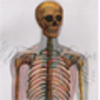 Since their formation in 1996, the only thing that has stayed the same about Piano Magic is how much they've changed. That and Glen Johnson, the only fixture of the group, which includes a revolving door lineup of musicians who come and go like breathing over the course of the project's numerous albums, EPs, soundtracks and compilations.
Since their formation in 1996, the only thing that has stayed the same about Piano Magic is how much they've changed. That and Glen Johnson, the only fixture of the group, which includes a revolving door lineup of musicians who come and go like breathing over the course of the project's numerous albums, EPs, soundtracks and compilations.
This collaborative atmosphere has resulted in wildly inconsistent results, which may be an advantage for the group, as it keeps their cult of interested listeners in a state of constant suspense about what each new release might bring. This new EP is the band's first release for Important, and it's also their first foray into full-blown electronic laptop-pop. There's been a heavy experimental, bedroom electronics feel to past releases, but this is the first time that Glen Johnson and Co. have gone high-tech, throwing their lot in with the likes of The Notwist and Postal Service. It seems a peculiarly calculated move for a band that never previously seemed to care about musical trends, and ultimately, I'm not sure if it pays off. The opening track "Echoes on Ice" employs the vocal talents of Klima's Angele David-Guillou against a cold backdrop of sparse digital glitchery with the barest subliminal suggestions of melody and rhythm. It's all very nice, but it sounds nearly identical to the music on Bjork's Vespertine album, and doesn't share the same tantalizingly mysterious atmosphere of previous Piano Magic efforts. It seems fairly derivative, and while it will doubtless appeal to those can't get enough of this sort of thing, it sounds rather tired and dull to me. "The Journal of a Disappointed Man" is inspired by the diaries of W.N.P. Barbellion, a work of terse miserablism that informs Glen Johnson's spoken-word vocals on the track, which continues the same minimal atmospherics from the opening track. "I Didn't Get Where I Am Today" again features singing by David-Guillou, another pointless Bjorkesque wintry ode to depression and solitude. Rounding out the brief EP is "This Heart Machinery," with vocals by Johnson, this time with slightly more compelling backing electronics. Judging by the liner notes for the album, which inform me that Jerome Tcherneyan and Cedric Pin are solely responsible for the music on the album, with Johnson only providing lyrics, it seems to me that Johnson has leaned too heavily on his collaborators this time, ending up with a release that is bland, faceless and unremarkable.
samples:
Read More
- Administrator
- Albums and Singles

Robot
It's slowmoving, chaotic in its continuously morphing volume, yet perfectlysettling and comforting. The low frequency rumbles that come in and outof phase are a complete mindwarp and play well to the higher pitchedsomewhat "lead instrument" sounds. I can't be sure what sound isactually being created by the alleged Air Harps or Wind Vanes but likea Mirror record, it's sometimes best to just sit back and let it takeover rather than overanalyze it too much. "K1" is the second piece onthe disc and if it sounds remotely familiar to some, it's because itwas originally named "Sucker for a Sob Story" back in the 1980s. "K1"was originally recorded and mixed with Steven Stapleton back in 1981 atIPS Studios. On the Historical AuricleCD, Stapleton is listed as contributing mix and sounds, while here he'sjust noted for his encouragement! Regardless, the 11-minute 24 year oldrecording sounds perfectly preserved and timeless, remarkably predatingall Nurse With Wound ambient recordings. "Eclipse" ends the CD, anearly 17 minute excerpt of a live recording which took place duringthe 1999 eclipse which seemed to effect other Europeans like Richard H.Kirk (see Darkness At Noon), Einstürzende Neubauten (see Total Eclipse of the Sun),and probably others I'm forgetting or avoiding. The Aeolian StringEnsemble's performance took place at Bosham Harbour and for the firstfew minutes it sounds as if the sea was captured in the background.Eventually the ensemble's own music overcomes all extraneous sounds aseverything builds into a thick, lush, and gorgeous aural soup,eventually breaking and giving way to the mutated sea sounds. Onceagain, the recording is nothing less than completely mesmerizing, andits brevity is almost a blessing and a tease at the same time. I doappreciate a well-developed ambient track but there are some people(I'm looking at you, Basinski) who need to know when to cut the songoff. The entire CD lasts less than 45 minutes, and it's perfect enoughto anticipate the next release, whenever that may surface. Like theonly other Aeolian full-length release, Eclipse is once againcovered by the artwork of Christoph Heemann and although it would benice to hang on a wall somewhere, the joy in this release is not anyfancy packaging, but the fantastic music contained herein.
samples:
Read More
- Administrator
- Albums and Singles
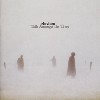
Temporary Residence Limited
Infact, Cooper has shown his ability to change dramatically not onlywithin songs but between albums. Whereas last year's An Accidental Memory in the Case of Death was a collection of crisp and clean piano pieces, Cooper's first album Lambent Material was a sonically dense patchwork of melody and static. Talk Amongst the Trees sounds much closer to Eluvium's debut album. But where Lambent Materialexplored the submarine, this album is an extended rumination on allthings celestial, ethereal, and airy. Song titles alone suggest part ofthis motif. "New Animals From the Air" starts the album with fivedistinct and critical layers of sounds all criss-crossing each otherand interweaving. There are echoes, reverberations, and ellipticaloverlaps. "Show Us Our Homes" looks up to the sky from the perspectiveof the ground instead of the suspension and flying in the previoussong. It is a calmer and more pensive affair, like looking up at cloudsor stars lying on your back. In harmony with the motif, "Calm of theCast-Light Cloud" is precisely what the inside of a cloud would soundlike, no more and no less. The centerpiece of the album is "Taken," aseventeen-minute expanse of pure altocumulus beauty. If the gods weretruly just, this song ought to have scored Nintendo's Kid Icarusgame. But since the game and the song are separated by about eighteenyears, I have my doubts regarding justice in this world. "Taken" is oneof the most narcotically dulcet songs ever put to ones and zeros. Youwant the song to continue interminably because everything about itseems right. Since it repeats a twenty-second melody consistently forseventeen minutes, it also has the effect of elongating and warpingtime, making the song seem longer than it is and giving the illusionthat you have been granted your wish for the song's interminability.The closer on the album is called "One" and it chimes equally withwindswept tones and oceanic resonances. A marriage of the aquatic andthe ethereal culminates in this song. The spectral power of Eluvium isall too crystal clear in Talk Amongst the Trees and you get thesense that the talk alluded to in the title is no more than the windrushing through weary boughs and leaves, giving form to what isessentially formless. This album simply floats and it is all butimpossible not to hover along with it.
samples:
Read More
- Administrator
- Albums and Singles

Morr Music
Her peculiar neo-folk/pop piecemeal brand of instrumentalsongwriting, brimming with pauses, false starts and isolating ofinstruments, had fallen short of attaining a certain level of adhesion;her first recording as a solo artist and not having a bevy of supportbehind her (remember: secret recording). The experience of recording adebut disc and subsequent performances over the past year-and-a-halfhave solidified Qrella's songwriting style and certainty as a soloartist, which are apparent on this new release. Again, recorded andmixed at "Villa Qrella," a more knowledgeable approach in studioproduction gives more conviction to the disc's eleven tracks. The titletrack's subtle electronic treatments, drawn out minor key chord changesand bright acoustic guitar lead off Unsolved Remained. Qrella'slyrics reflect on a past relationship; her vocals retaining theirdelicate and breathy characteristics as the electric guitar powerchords ring out over controlled feedback. The heavy bass end andoffbeat guitar stabs of "I Can't Tell" play against shifting andbroken-up rhythm programming, choppy vocal lines and various synthlayers. The whole thing eventually settles into a unique country/reggaemanipulation (!!) completed by the addition of flutes. "DestinationVertical," by far the coolest track on the disc, is based on a synthand steady machine-beat pulsing track by Berlin-based electronicaudio/video crew, Rechenzentrum. Qrella's addition of descendingvibrato-laden guitar melody, power chords and lyrics that conveyimagery of being high atop the snow-covered mountain peaks have thistrack yearning to be busted out by club DJs in the regulation 12"format. As her first release for the Morr label, Qrella's fashion ofvocal electro-pop is in good company with like-minded artists such asStyrofoam, the Go Find, Tarwater and Lali Puna. With any luck, she'llsoon be as prominent a figure as her label mates.
samples:
Read More
- Administrator
- Albums and Singles
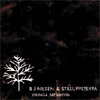
The Helen Scarsdale Agency
Beginning this remarkably cohesive 56 minute set, "En Dare Kan FragaMer An Tre Visa Kan Svara" approaches like distant footsteps trying towalk straight on a windy path. Small rustling sounds eventuallycoalesce into thicker swarms over 12 minutes. This music is successfulbecause it recalls a barren landscape, but still provides small,recognizable nuances to cling to. The quiet crackling sounds, belltones and low moans which hover just below the long sustained tones ofeach piece add depth. At first Vikinga Brennivinseems minimalist in that there are no melodic or rhythmic elements.However, its appeal lies in uncovering the many layers of sound thatmake up this minimal facade. During "Heilir, thorn eirs hlyddu" thereis a wall of static that is barely noticeable until it is suddenlyremoved from the mix at the six minute mark. The six minutes thatfollow this shift are then more interesting because they feel likeundergrowth being pulled to the surface for inspection. On "En Dare..."and "Det Ar..." the trio pursue a decidedly more organic sound, whileon "Heilir..." and "Vidunder" a digital patina is added to the low-endrumbling that provides contrast but doesn't sound too jarring. On"Vidunder" in particular, sharp high-end digital stabs echo fromspeaker to speaker and are the closest the trio get to achievingrhythmic tension. During "Det Ar..." a single low tone is given severalminutes to meander before being joined by what sounds like smoke or gasbeing emitted from a pipe. The effect is akin to watching clouds passslowly overhead through a skylight. The sounds that are used throughoutthe album sound as if they were carefully chosen. The group meets itsobjective of combining elements in ways that produce subtly changing,atmospheric works in which more is discovered upon each listen. Theyseem well-attuned to a common mission and the result sounds moreseamless than simply being the sum of familiar parts. The gorgeous,unique silkscreened copper plate by Jim Haynes that serves as thesleeve for the first edition of 300 enhances the perception that thisis a work which has been carefully and lovingly crafted out of acombination of passion and skill.
samples:
Read More
